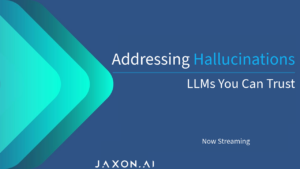At Jaxon AI, we understand the critical role of Large Language Models (LLMs) in driving innovation and efficiency in various sectors, especially regulated industries. A significant challenge that has emerged in the realm of LLMs is the issue of “hallucinations” – when AI models generate incorrect, nonsensical, or misleading information. This concern is particularly crucial for Chief Information Security Officers (CISOs) who are responsible for ensuring the security, reliability, and ethical use of AI technologies.
The Hallucination Challenge in LLMs
Hallucinations in LLMs are not just minor errors; they represent a fundamental challenge to the integrity and reliability of AI-driven systems. For organizations leveraging our DSAIL product, which relies heavily on LLMs, addressing these issues is not just a technical necessity but a business imperative.

Security and Reliability
Inaccurate or misleading outputs from LLMs can lead to security vulnerabilities and misinformed decisions, directly impacting the operational integrity of an organization. Ensuring the reliability and accuracy of information provided by DSAIL is crucial to mitigate potential risks.
Maintaining Trust
The credibility of DSAIL, and by extension, our clients’ trust in Jaxon AI, hinges on the dependability of our AI systems. In a world where AI-driven solutions are increasingly customer-facing, maintaining the accuracy and reliability of these systems is paramount.
Compliance and Ethical Considerations
Our commitment to ethical AI practices involves rigorous compliance with regulatory standards. Hallucinations in LLMs pose a significant challenge in sectors like Financial Services, Insurance, Healthcare, and Life Sciences where misinformation can have serious legal implications.
Formal Methods
At the core of DSAIL’s effectiveness is our emphasis on formal methods. With mathematical proof that the output is accurate, DSAIL brings trust; making non-deterministic systems perform in a deterministic way. Addressing hallucinations in LLMs is a direct reflection of our commitment to AI integrity and quality control.
Preventing Misinformation
In the age of information overload, ensuring that DSAIL does not contribute to the spread of misinformation is a responsibility we take seriously. We are dedicated to providing accurate and factual information through our AI systems.
Strategic Decision Making
For organizations that rely on AI for strategic decision-making, the accuracy of information is non-negotiable. We are committed to ensuring that LLMs provide reliable insights for informed decision-making with what we call DSAIL guardrails.
Our Approach
To address these challenges, Jaxon AI is pioneering solutions that embrace:
- Advanced Training and Fine-Tuning: We are continually refining our own models of computation for DSAIL with diverse, accurate, and comprehensive data that represent real world solutions to reducing the incidence of hallucinations.
- Ethical AI Frameworks: We adhere to strict ethical guidelines in AI development and deployment, ensuring that DSAIL operates within the bounds of regulatory compliance and ethical norms.
- Continual Learning and Improvement: DSAIL is designed to learn and adapt, reducing the frequency of hallucinations over time through advanced machine learning techniques.
At Jaxon AI, addressing the hallucination problem in LLMs is more than a technical challenge; it’s a commitment to our clients’ security, trust, and success. With DSAIL, we are setting new standards in reliable, ethical, and effective AI solutions. Join us in embracing a future where AI drives innovation without compromising on accuracy and integrity.
Want to learn more? Contact us and let’s get started!





